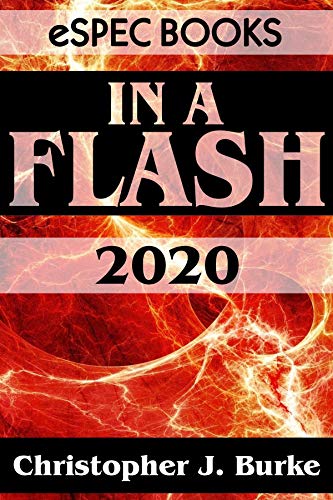Thanks for stopping by! Leave a comment, and tell me what you think.
Or check out some other comics.
Permission is granted for educational bloggers to repost this comic, as long as you link back to this post. Thanks.

That's English-teacher code for I'm not with them.
Edit: More about chai tea.
Edit: It occurred to me today that I could have just had a tablecloth over the table instead of sitting them all behind a counter. My artistic ability needs to catch up with my mind's eye.
I also write Fiction!Check out In A Flash 2020, by Christopher J. Burke for 20 great flash fiction stories, perfectly sized for your train rides. Available in softcover or ebook at Amazon. If you enjoy it, please consider leaving a rating or review on Amazon or on Good Reads. Thank you. |
 |

















27 comments:
hahahaha nice joke men.. took me some time XD
Oh, English teachers... Chai means tea. You're drinking tea tea! ;) Very funny cartoon though.
Nice! I like it. Was this inspired by the coffee-logicians riddle?
Yes, that, posed by Will Shortz on NPR one Sunday, probably the easiest puzzle he ever posed (for me, at least), combined with the number of coffee references I've made over the years and the fact that I've been in charge of making the coffee in the teacher center for the past few years.
And, of course, my previous reference to chai tea and English teachers ...
Oh, English teachers... Chai means tea. You're drinking tea tea!
This, of course, is based on the mistaken assumption that when we mug some poor innocent foreign language in a dark alley and rifle through its pockets for any interesting words, we are somehow legally compelled to use such words just the way they were used by their rightful owner. Cf., panini, shrimp scampi, and the hoi polloi.
Faldone, while you're perfectly correct in saying that English can and does use foreign imports any way it likes, the request "chai tea, please" still assumes a knowledge of what "chai tea" means in English - which I certainly don't have, and I don't think many other British English speakers would either. Herbed tea? Spiced tea? And where does "chai latte" (or "milky tea") fit in?
Generally, in American English, "chai tea" means a hot beverage made with boiling water and a tea bag from a box labelled "Chai tea".
If you click on the link under the comic, that will just take you to an earlier comic featuring two of those characters where chai tea was mentioned, so I used it again for consistency. A comic like this doesn't get much in the way of character development.
In Canada/US, chai tea is typically a spicy blend of black tea used for making what we call "chai lattes," a steamed milk tea drink. This confusion in terms is likely due to Starbucks.
The confusion was deliberately created by Oregon Chai, which first marketed the blended sweetened Tea. The term "chai" was added for marketing effect to distinguish from the normal drip tea. Starbucks picked up the recipe seeing its success.
http://i.imgur.com/EPHKK.png
I agree about "chai tea" being weird but widely used term, though.
Masala chai, or chai masala.
Great joke! My sub-continent friends call their spiced tea, Chai tea, to differentiate it from from 'regular' tea. A similar phrase would be Gelato Ice Cream.
Thanks to the popularity of this comic, a follow-up was in order:
http://mrburkemath.blogspot.com/2011/10/coffee-logic-part-2.html
Dedicated to the Language Log folks:
A Chai Tea comic.
Don't you need to tell the order in which they answered? If read in the wrong order (say, from right to left), it does not make sense... Anyway, it is fun!
Why would you read it from right to left?
(I hope you're reading this from left to right. Otherwise, this sentence won't make much sense, either.)
James 007b has a valid question. Why would you assume that the person farthest away from the questioner will answer first? The person closest to the questioner will be expected to answer first, that is the rightmost minus one person. the rightmost person is the questioner of course.
Because it's a comic, and comics are read from left to right, top to bottom, by default.
And to give in and use a real-world example, when sitting in a booth and the waitress takes the order, she generally gets the order of the people farther away first and then the ones next to her, but I can't say that this is universal.
What's the joke here?
:)) haha, funny but I must google for explanation
You can try here. http://www.beingamathematician.org/Jokes/LogiciansJoke.html
Thanks for stopping by. If you want logicians in a bar, you should go to the original source page, with is Spiked Math. http://spikedmath.com/445.html
This is great fun! Sharing with my students via Instagram
The problem with her conclusion is that she couldn't have actually known that the 4 people who said "I don't know" were planning on getting coffees, or even that the person who said, "No" meant that, "No, I don't want a coffee" (he could have mistakenly assumed he knew the answer, and answered the question), while the 4 others simply answered the question honestly.
For example, 2 of the 4 people who said, "I don't know" might have just been answering the question, while they did want coffees, while the other 2 were just answering the question, while they did not want coffees, and then finally, the last guy could have assumed been assuming the answer was "No" (as in, he assumed the other 4 were not getting coffees, but failed to mention that he was, instead of turning down the coffee). While the 5th man would have been correct in answering the question at face value, he could have also been turning it down.
Alternatively, when the woman asked if they would all be getting coffees, the first 4 might have answered the question literally, while they all intended to get coffees, and the 5th guy might have answered the question literally, while intending to get a coffee, too. In this case, he would have been wrong with his literal answer; if all 5 of them answered the question literally (whether honestly or wrongly), the actual placement of their order might have proven the 5th man to be incorrect, when the woman eventually had to bring them all coffees.
It's cute, but it's too ambiguous.
Or she works in a diner near a school and she's used to these wackos showing up.
It's a twist on an old logic puzzle, which I previously had heard mentioned by puzzle editor Will Shortz on NPR's Weekend Edition.
:)) haha, funny
Hello, thank you for saying how much you enjoyed my post even more than a bot enjoys posts. I have to apologize for now having a chance to get here sooner to delete you ad.
If you wish to advertise on my site, contact me about my exorbitant rates. Or actually contribute to the conversation.
Don't be a bot.
Post a Comment